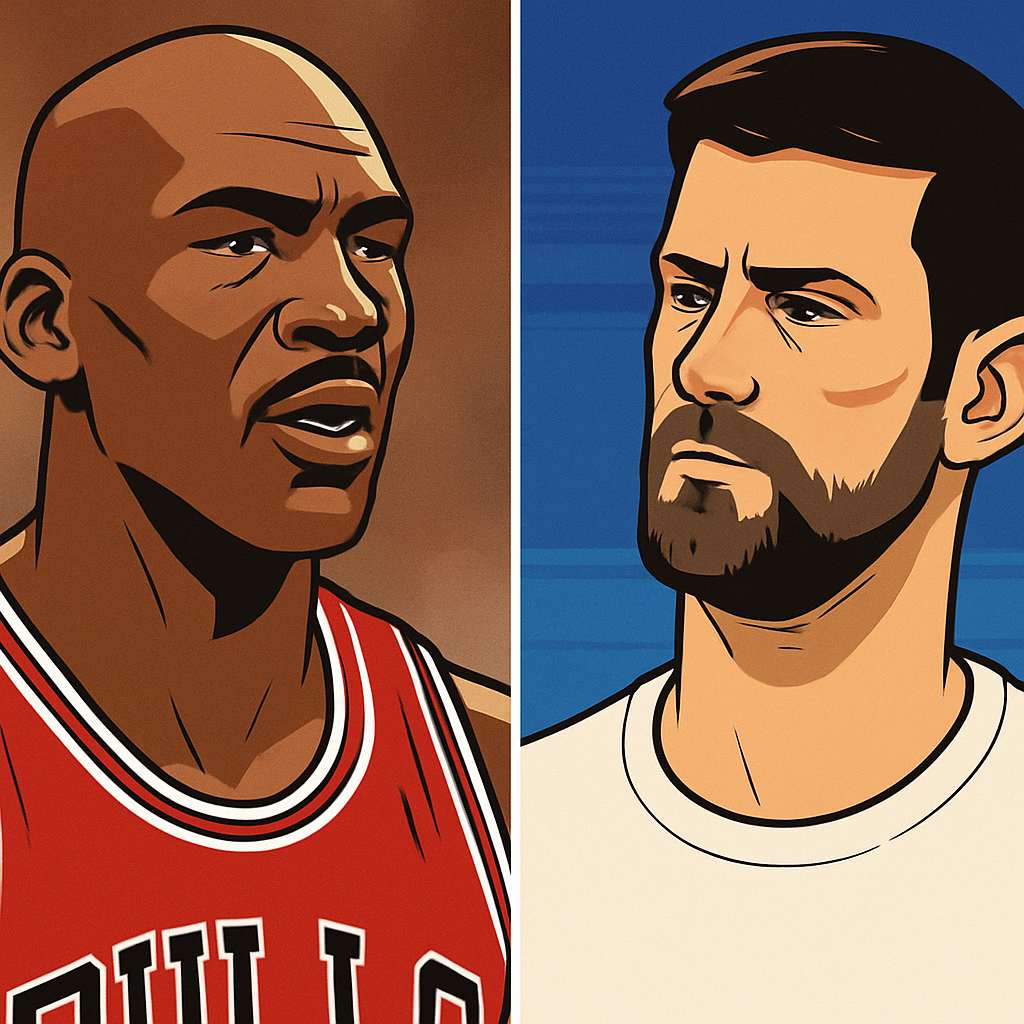In the pantheon of sporting greatness, the name Michael Jordan transcends basketball. It has become the universal shorthand for a singular, almost mythical combination of talent, willpower, and an unshakable aura that intimidates opponents before a ball is even in play. For decades, the tennis world has searched for its own equivalent. While the statistical argument for Novak Djokovic as the Greatest of All Time (GOAT) is ironclad, a compelling case is being made that the sport’s true Jordanesque figure is not the Serbian machine, but the Spanish matador, Rafael Nadal.
The Intangible X-Factor: Beyond the Numbers
The GOAT debate in men's tennis is typically a cold, hard numbers game: 24 Grand Slams for Djokovic, 22 for Nadal, 20 for Roger Federer. Djokovic leads in weeks at World No. 1, Year-End Championships, and head-to-head records against his two rivals. By these pure metrics, his claim is undeniable. Yet, greatness is not measured by spreadsheet alone. It is also measured in feeling, in narrative, and in an intangible "X-factor" that defines a competitor's spirit. This is where the comparison to Michael Jordan takes root, and it favors Nadal. As sports commentator and former player Brad Gilbert noted, "Rafa has that Jordan killer instinct, that look. You just know he believes he's going to win every big point."
The Aura of Invincibility: A Fortress of Belief
What defined Michael Jordan was not just his scoring titles or championships, but the aura he carried. Opponents entered a game against the Chicago Bulls already half-beaten, psychologically defeated by the specter of "His Airness." In tennis, Rafael Nadal has cultivated a similar fortress of belief, most potently on the clay courts of Roland Garros. His record there—14 titles, 112 wins against just 3 losses—is arguably the most dominant feat in any individual sport. Stepping onto Court Philippe-Chatrier to face Nadal is a unique form of sporting torture. Players don't just face a man; they face a myth, a legacy, and a wall of relentless intensity. This psychological warfare, this pre-match concession, is straight out of the Jordan playbook.
The Embodiment of Relentless Will
Both Jordan and Nadal are celebrated for a ferocious, almost pathological competitive drive that borders on the supernatural. Jordan’s "Flu Game" in the 1997 NBA Finals is legend. Nadal’s career is a highlight reel of similar performances played on a bad knee, a numb foot, or through sheer exhaustion. His 2022 Australian Open victory, coming back from two sets down against Daniil Medvedev after missing much of the previous season with a chronic foot injury, defied logic and medicine. It wasn't about having the most perfect game that day; it was about having the most will. This quality separates the very good from the immortal. As seven-time Grand Slam champion Mats Wilander once said, "Novak is the most complete player, but Rafa is the greatest competitor I have ever seen in any sport."
The Elements of a Jordanesque Athlete:
- Unmatched Aura: The opponent's defeat begins in their own mind before the contest even starts.
- Relentless Work Ethic: A legendary, almost obsessive dedication to preparation and improvement.
- Clutch Gene: An innate ability to elevate performance at the most critical moments.
- Iconic Signature: A move or trait that defines them (Jordan's tongue-wagging dunk, Nadal's furious fist-pump).
- Emotional Resonance: A playing style and personality that generates a deep, visceral connection with the audience.
The Djokovic Contrast: A Machine of Perfection
This is not to diminish Novak Djokovic’s greatness, which is of a different, equally breathtaking kind. If Nadal is the fiery, emotional gladiator, Djokovic is the cold, impeccable machine. His greatness is built on flawless technique, elastic athleticism, and a preternatural ability to absorb and redirect power. He is the ultimate problem-solver. His mental strength is phenomenal, but it often manifests as an impenetrable calm and robotic focus, whereas Nadal's (and Jordan's) manifests as a fiery, visible passion. Djokovic breaks opponents with precision and consistency; Nadal (and Jordan) breaks them with force of will and heart.
The People's Champion: Emotional Resonance
Another key component of the Jordan comparison is the athlete's connection to the crowd. Jordan wasn't just great; he was beloved. He was theatrical, emotional, and played with a visible passion that fans could feel. Nadal, with his humble demeanor, on-court grimaces, and raw emotional release, generates a similar fervor. Djokovic, for all his achievements, has often struggled to win the universal affection of crowds, who frequently side with his opponents. This dynamic—battling not just the man across the net but the thousands in the stands—mirrors the challenges faced by other great but polarizing figures like LeBron James, who operated in Jordan's shadow for much of his career. It adds a layer of narrative struggle to Nadal's victories that Djokovic's often lack.
Tennis analyst and former player Pam Shriver encapsulates this sentiment: "What makes Rafa the Jordan of tennis is the combination of the incredible record and the way he makes people feel. When you watch him, you see every ounce of his being poured into every point. It’s visceral. Novak is an artist of efficiency and perfection, which is awe-inspiring, but it doesn't always connect emotionally in the same raw way."
Conclusion: The GOAT vs. The Soul
The debate is ultimately a tale of two definitions of greatness. If you define it purely by the accumulation of accolades, statistical supremacy, and overall mastery of the craft, then Novak Djokovic is the tennis GOAT, and his resume makes an objective case that may never be matched. However, if greatness is defined by that indescribable X-factor—the aura of invincibility, the relentless visible will, the iconic signature moments, and the deep, emotional resonance with a global audience—then tennis has its Michael Jordan. His name is Rafael Nadal. He possesses the intangible soul of a competitor that transcends the record books, a quality that makes his claim on history uniquely powerful and eternally compelling.

